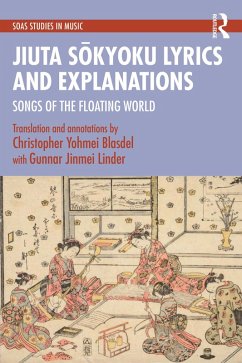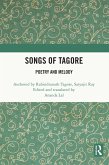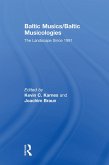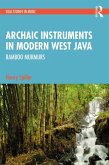Christopher Yohmei Blasdel
Jiuta Sokyoku Lyrics and Explanations (eBook, ePUB)
Songs of the Floating World
42,95 €
42,95 €
inkl. MwSt.
Sofort per Download lieferbar

21 °P sammeln
42,95 €
Als Download kaufen

42,95 €
inkl. MwSt.
Sofort per Download lieferbar

21 °P sammeln
Jetzt verschenken
Alle Infos zum eBook verschenken
42,95 €
inkl. MwSt.
Sofort per Download lieferbar
Alle Infos zum eBook verschenken

21 °P sammeln
Christopher Yohmei Blasdel
Jiuta Sokyoku Lyrics and Explanations (eBook, ePUB)
Songs of the Floating World
- Format: ePub
- Merkliste
- Auf die Merkliste
- Bewerten Bewerten
- Teilen
- Produkt teilen
- Produkterinnerung
- Produkterinnerung

Bitte loggen Sie sich zunächst in Ihr Kundenkonto ein oder registrieren Sie sich bei
bücher.de, um das eBook-Abo tolino select nutzen zu können.
Hier können Sie sich einloggen
Hier können Sie sich einloggen
Sie sind bereits eingeloggt. Klicken Sie auf 2. tolino select Abo, um fortzufahren.

Bitte loggen Sie sich zunächst in Ihr Kundenkonto ein oder registrieren Sie sich bei bücher.de, um das eBook-Abo tolino select nutzen zu können.
'Jiuta Sokyoku Lyrics and Explanations' is a compendium of seventy-three representative songs from the well-known genre of traditional Japanese Edo-period sankyoku ensemble music.
- Geräte: eReader
- mit Kopierschutz
- eBook Hilfe
Andere Kunden interessierten sich auch für
![Jiuta Sokyoku Lyrics and Explanations (eBook, PDF) Jiuta Sokyoku Lyrics and Explanations (eBook, PDF)]() Christopher Yohmei BlasdelJiuta Sokyoku Lyrics and Explanations (eBook, PDF)42,95 €
Christopher Yohmei BlasdelJiuta Sokyoku Lyrics and Explanations (eBook, PDF)42,95 €![Making Jazz in Contemporary Japan (eBook, ePUB) Making Jazz in Contemporary Japan (eBook, ePUB)]() Marie BuscattoMaking Jazz in Contemporary Japan (eBook, ePUB)39,95 €
Marie BuscattoMaking Jazz in Contemporary Japan (eBook, ePUB)39,95 €![Songs of Tagore (eBook, ePUB) Songs of Tagore (eBook, ePUB)]() Rabindranath TagoreSongs of Tagore (eBook, ePUB)42,95 €
Rabindranath TagoreSongs of Tagore (eBook, ePUB)42,95 €![The City of Hip-Hop (eBook, ePUB) The City of Hip-Hop (eBook, ePUB)]() Rob SwiftThe City of Hip-Hop (eBook, ePUB)38,95 €
Rob SwiftThe City of Hip-Hop (eBook, ePUB)38,95 €![Made in Puerto Rico (eBook, ePUB) Made in Puerto Rico (eBook, ePUB)]() Made in Puerto Rico (eBook, ePUB)42,95 €
Made in Puerto Rico (eBook, ePUB)42,95 €![Baltic Musics/Baltic Musicologies (eBook, ePUB) Baltic Musics/Baltic Musicologies (eBook, ePUB)]() Baltic Musics/Baltic Musicologies (eBook, ePUB)50,95 €
Baltic Musics/Baltic Musicologies (eBook, ePUB)50,95 €![Archaic Instruments in Modern West Java: Bamboo Murmurs (eBook, ePUB) Archaic Instruments in Modern West Java: Bamboo Murmurs (eBook, ePUB)]() Henry SpillerArchaic Instruments in Modern West Java: Bamboo Murmurs (eBook, ePUB)42,95 €
Henry SpillerArchaic Instruments in Modern West Java: Bamboo Murmurs (eBook, ePUB)42,95 €-
-
-
'Jiuta Sokyoku Lyrics and Explanations' is a compendium of seventy-three representative songs from the well-known genre of traditional Japanese Edo-period sankyoku ensemble music.
Dieser Download kann aus rechtlichen Gründen nur mit Rechnungsadresse in A, B, BG, CY, CZ, D, DK, EW, E, FIN, F, GR, HR, H, IRL, I, LT, L, LR, M, NL, PL, P, R, S, SLO, SK ausgeliefert werden.
Produktdetails
- Produktdetails
- Verlag: Taylor & Francis eBooks
- Seitenzahl: 224
- Erscheinungstermin: 9. Mai 2024
- Englisch
- ISBN-13: 9781040023068
- Artikelnr.: 70335209
- Verlag: Taylor & Francis eBooks
- Seitenzahl: 224
- Erscheinungstermin: 9. Mai 2024
- Englisch
- ISBN-13: 9781040023068
- Artikelnr.: 70335209
- Herstellerkennzeichnung Die Herstellerinformationen sind derzeit nicht verfügbar.
Christopher Yohmei Blasdel began the shakuhachi in 1972 under legendary shakuhachi master Yamaguchi Goro, completed his MA in ethnomusicology from Tokyo University of Arts in 1982 and received his shihan license from Yamaguchi in 1984. As a scholar and performer, Blasdel focuses both on traditional and contemporary music. He has released several CDs, shakuhachi reference books and has composed music for NHK documentaries and various films. He co-organized the Boulder World Shakuhachi Festival (1998), the Sydney World Shakuhachi Festival (2008) and was co-founder of the Prague Shakuhachi Festival. He presently lectures at University of Hawai'i and holds a fifth-degree black belt in Aikido.
Gunnar Jinmei Linder came to Japan in 1985, with a BA in philosophy and Japanology, and began studies of shakuhachi with Yamaguchi Goro. He received an MA in shakuhachi from the Traditional Music Conservatoire at Tokyo University of the Arts in 1997, and the traditional license shihan in 1998. After many years in Japan as stage and recording artist, as well as teacher of shakuhachi, he returned to his native Sweden and received a PhD in Japanology at Stockholm University in 2012 (Deconstructing Tradition in Japanese Music). In 2016 he received a diploma from the Japanese Minister of Foreign Affairs for his artistic and academic activities.
Gunnar Jinmei Linder came to Japan in 1985, with a BA in philosophy and Japanology, and began studies of shakuhachi with Yamaguchi Goro. He received an MA in shakuhachi from the Traditional Music Conservatoire at Tokyo University of the Arts in 1997, and the traditional license shihan in 1998. After many years in Japan as stage and recording artist, as well as teacher of shakuhachi, he returned to his native Sweden and received a PhD in Japanology at Stockholm University in 2012 (Deconstructing Tradition in Japanese Music). In 2016 he received a diploma from the Japanese Minister of Foreign Affairs for his artistic and academic activities.
Lists of Figures Glossary 1. Introduction 2. Introduction to the Art of Jiuta S
kyoku 3. Aki no Koto no Hä
4. Aki no Kyoku
5. Akikaze no Kyoku
6. Azuma-jishi
7. Chaondo
8. Chidori no Kyoku
9. Chikubushima
10. Chiyo no Uguisu
11. Ch
gonka no Kyoku
12. Echigo-jishi
13. Enoshima no Kyoku
14. Fune no Yume
15. Fuyu no Kyoku
16. Godan-ginuta
17. Hagi no Tsuyu
18. Haru no Kyoku
19. Hototogisu
20. Imakomachi
21 Iso Chidori
22 Kaede no Hanä
23 Kaji Makurä
24 Katsura O
25 Keshi no Hana
26 Kog
no Kyoku
27 Konkai
28 Kotobuki Kurabe
29 Kurokami
30 Kyoku Nezumi
31 Mama no Kawa
32 Matsukaze
33 Meiji Sh
chikubai
34 Mitsu no Keshiki
35 Mitsuyamä
36 Miyako no Haru
37 Miyama-jishi
38 Nanakomachi
39 Nasuno
40 Natsu no Kyoku
41 Nebiki no Matsu
42 Onoe no Matsu
43
mi Hakkei
44
uchiyama
45 Saga no Aki
46 Saigy
-zakura
47 Sakura-gari
48 Sakura-gawa
49 Sasa no Tsuyu
50 Shiki no Nagame
51 Shin Aoyagi
52 Shin Musume D
j
ji
53 Shin Takasago
54 Sh
chikubai
55 Sono no Aki
56 Sue no Chigiri
57 Suma no Arashi
58 Sumiyoshi
59 Tama no Utena
60 Tama-gawa
61 T
ru
62 Tsuru no Koe
63 Uji Meguri
64 Ukifune
65 Usu no Koe
66 Wakana
67 Yachiyo-jishi
68 Yaegoromo
69 Yotsu no Tami
70 Yoyo no Hoshi
71 Y
be no Kumo
72 Y
gao
73 Yuki
74 Yuya
75 Zangetsu
Bibliography Index
kyoku 3. Aki no Koto no Hä
4. Aki no Kyoku
5. Akikaze no Kyoku
6. Azuma-jishi
7. Chaondo
8. Chidori no Kyoku
9. Chikubushima
10. Chiyo no Uguisu
11. Ch
gonka no Kyoku
12. Echigo-jishi
13. Enoshima no Kyoku
14. Fune no Yume
15. Fuyu no Kyoku
16. Godan-ginuta
17. Hagi no Tsuyu
18. Haru no Kyoku
19. Hototogisu
20. Imakomachi
21 Iso Chidori
22 Kaede no Hanä
23 Kaji Makurä
24 Katsura O
25 Keshi no Hana
26 Kog
no Kyoku
27 Konkai
28 Kotobuki Kurabe
29 Kurokami
30 Kyoku Nezumi
31 Mama no Kawa
32 Matsukaze
33 Meiji Sh
chikubai
34 Mitsu no Keshiki
35 Mitsuyamä
36 Miyako no Haru
37 Miyama-jishi
38 Nanakomachi
39 Nasuno
40 Natsu no Kyoku
41 Nebiki no Matsu
42 Onoe no Matsu
43
mi Hakkei
44
uchiyama
45 Saga no Aki
46 Saigy
-zakura
47 Sakura-gari
48 Sakura-gawa
49 Sasa no Tsuyu
50 Shiki no Nagame
51 Shin Aoyagi
52 Shin Musume D
j
ji
53 Shin Takasago
54 Sh
chikubai
55 Sono no Aki
56 Sue no Chigiri
57 Suma no Arashi
58 Sumiyoshi
59 Tama no Utena
60 Tama-gawa
61 T
ru
62 Tsuru no Koe
63 Uji Meguri
64 Ukifune
65 Usu no Koe
66 Wakana
67 Yachiyo-jishi
68 Yaegoromo
69 Yotsu no Tami
70 Yoyo no Hoshi
71 Y
be no Kumo
72 Y
gao
73 Yuki
74 Yuya
75 Zangetsu
Bibliography Index
Lists of Figures Glossary 1. Introduction 2. Introduction to the Art of Jiuta S
kyoku 3. Aki no Koto no Hä
4. Aki no Kyoku
5. Akikaze no Kyoku
6. Azuma-jishi
7. Chaondo
8. Chidori no Kyoku
9. Chikubushima
10. Chiyo no Uguisu
11. Ch
gonka no Kyoku
12. Echigo-jishi
13. Enoshima no Kyoku
14. Fune no Yume
15. Fuyu no Kyoku
16. Godan-ginuta
17. Hagi no Tsuyu
18. Haru no Kyoku
19. Hototogisu
20. Imakomachi
21 Iso Chidori
22 Kaede no Hanä
23 Kaji Makurä
24 Katsura O
25 Keshi no Hana
26 Kog
no Kyoku
27 Konkai
28 Kotobuki Kurabe
29 Kurokami
30 Kyoku Nezumi
31 Mama no Kawa
32 Matsukaze
33 Meiji Sh
chikubai
34 Mitsu no Keshiki
35 Mitsuyamä
36 Miyako no Haru
37 Miyama-jishi
38 Nanakomachi
39 Nasuno
40 Natsu no Kyoku
41 Nebiki no Matsu
42 Onoe no Matsu
43
mi Hakkei
44
uchiyama
45 Saga no Aki
46 Saigy
-zakura
47 Sakura-gari
48 Sakura-gawa
49 Sasa no Tsuyu
50 Shiki no Nagame
51 Shin Aoyagi
52 Shin Musume D
j
ji
53 Shin Takasago
54 Sh
chikubai
55 Sono no Aki
56 Sue no Chigiri
57 Suma no Arashi
58 Sumiyoshi
59 Tama no Utena
60 Tama-gawa
61 T
ru
62 Tsuru no Koe
63 Uji Meguri
64 Ukifune
65 Usu no Koe
66 Wakana
67 Yachiyo-jishi
68 Yaegoromo
69 Yotsu no Tami
70 Yoyo no Hoshi
71 Y
be no Kumo
72 Y
gao
73 Yuki
74 Yuya
75 Zangetsu
Bibliography Index
kyoku 3. Aki no Koto no Hä
4. Aki no Kyoku
5. Akikaze no Kyoku
6. Azuma-jishi
7. Chaondo
8. Chidori no Kyoku
9. Chikubushima
10. Chiyo no Uguisu
11. Ch
gonka no Kyoku
12. Echigo-jishi
13. Enoshima no Kyoku
14. Fune no Yume
15. Fuyu no Kyoku
16. Godan-ginuta
17. Hagi no Tsuyu
18. Haru no Kyoku
19. Hototogisu
20. Imakomachi
21 Iso Chidori
22 Kaede no Hanä
23 Kaji Makurä
24 Katsura O
25 Keshi no Hana
26 Kog
no Kyoku
27 Konkai
28 Kotobuki Kurabe
29 Kurokami
30 Kyoku Nezumi
31 Mama no Kawa
32 Matsukaze
33 Meiji Sh
chikubai
34 Mitsu no Keshiki
35 Mitsuyamä
36 Miyako no Haru
37 Miyama-jishi
38 Nanakomachi
39 Nasuno
40 Natsu no Kyoku
41 Nebiki no Matsu
42 Onoe no Matsu
43
mi Hakkei
44
uchiyama
45 Saga no Aki
46 Saigy
-zakura
47 Sakura-gari
48 Sakura-gawa
49 Sasa no Tsuyu
50 Shiki no Nagame
51 Shin Aoyagi
52 Shin Musume D
j
ji
53 Shin Takasago
54 Sh
chikubai
55 Sono no Aki
56 Sue no Chigiri
57 Suma no Arashi
58 Sumiyoshi
59 Tama no Utena
60 Tama-gawa
61 T
ru
62 Tsuru no Koe
63 Uji Meguri
64 Ukifune
65 Usu no Koe
66 Wakana
67 Yachiyo-jishi
68 Yaegoromo
69 Yotsu no Tami
70 Yoyo no Hoshi
71 Y
be no Kumo
72 Y
gao
73 Yuki
74 Yuya
75 Zangetsu
Bibliography Index







